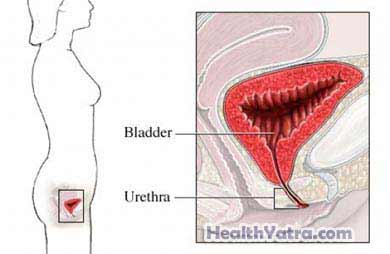Definition
Stress incontinence is one of the many causes of uncontrolled leaking of urine. Urethral suspension is a surgery to correct incontinence in women.
The incontinence is most often caused by weakening of the pelvic muscles that normally keep the bladder in position. The muscles may be weakened by:
- Pregnancy
- Childbirth
- Menopause
- Previous pelvic surgery
- Lack of physical activity

Reasons for Procedure
The goal of this surgery is to provide extra support to the urethra and give more resistance against leakage. This will stop the uncontrolled leaking of urine.
Possible Complications
Complications are rare, but no procedure is completely free of risk. If you are planning to have a urethral suspension, your doctor will review a list of possible complications which may include:
- Bleeding
- Infection
- Reactions to anesthesia
- Inability to urinate
- Continued incontinence or recurrence of the problem
- Damage to other nearby organs or blood vessels
- Erosion of the mesh material used during the procedure
- Pain (such as, during sexual intercourse)
Factors that may increase the risk of complications include:
- Smoking
- Your overall health
Talk to your doctor about any factors that may increase your risk.
What to Expect
Prior to Procedure
Your doctor will try to find out why you are leaking urine through some or all of the following:
- Medical history—information about medicines, illnesses, number of pregnancies, and previous surgeries; pattern of leaking and how it is affecting your life
- Urine sample—to look for the presence of infection or other problems
- Physical exam—includes a rectal and vaginal exam
- Additional testing may be ordered to evaluate bladder function and urine flow, such as:
- Urodynamic testing (urine flow studies)—a temporary catheter is placed to study bladder function
- Cystoscopy—a procedure done to view the inside of the bladder
Leading up to surgery:
- Talk to your doctor about your medicines. You may be asked to stop taking some medicines up to one week before the procedure, like:
- Aspirin or other anti-inflammatory drugs
- Blood thinners, such as warfarin (Coumadin)
- Clopidogrel (Plavix)
- Arrange for a ride home from the hospital.
- Do not eat or drink anything after midnight the night before.
Anesthesia
You may receive a spinal anesthetic to numb your lower body. General anesthesia may also be used, in which case you will be asleep.
Description of Procedure
Two incisions will be made in the vagina. A nylon mesh-like tape will be inserted in these incisions to form a hammock. This will give support to the urethra, closing the urethra during a cough or sneeze. No sutures will be needed to hold the tape in place. The mesh will hold onto the surrounding tissue until scar tissue grows into it.
Immediately After Procedure
After surgery, you will be monitored in a recovery room. You will most likely have a catheter in place to drain your urine.
How Long Will It Take?
1-1.5 hours
How Much Will It Hurt?
Anesthesia will block pain during the surgery. After surgery, you may experience some pain or soreness. You will be given pain medicine to relieve discomfort.
Average Hospital Stay
You may be able to go home the same day.
Postoperative Care
At the Hospital
At first, your urine may look bloody. This will resolve over time. When you are able to empty your bladder completely, the catheter will be removed. You may be up and walking the same day as the surgery.
At Home
Avoid lifting and strenuous exercise for six weeks after surgery. This will allow healing to take place. Ask your doctor about when it is safe to shower, bathe, or soak in water.
To help ensure a smooth recovery, follow your doctor’s instructions.
Call Your Doctor
After you leave the hospital, contact your doctor if any of the following occurs:
- Signs of infection, including fever and chills
- Redness, swelling, increasing pain, excessive bleeding, or any discharge from the incision sites
- Pain that you cannot control with the medicines you have been given
- Cough, shortness of breath, or chest pain
- Severe nausea or vomiting
- Trouble urinating
- Pain, burning, urgency, or frequency while urinating
In case of an emergency, call for medical help right away.
